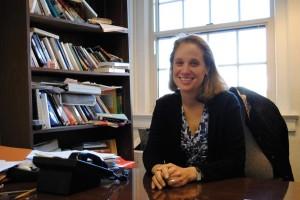
Professor Debelius helps students in and outside class by leading the Georgetown University Writing Center.
It’s hard not to smile when you’re talking to professor Maggie Debelius — her bubbly personality and enthusiasm is contagious. The associate director of the English department and the director of Georgetown’s Writing Center, Debelius has been teaching at Georgetown for the last 10 years. She’s working on a new edition of her 2001 book So What are You Going to Do With That?: Finding Careers Outside Academia. Debelius sat down with the guide to talk about her work, her book and the changes she’s seen at Georgetown over the years.
Can you tell us a little bit about what you do here?
I direct the Writing Center and I also teach in the English department. It’s a great job for me. I’ve been here for 10 1/2 years and I also got my master’s at Georgetown, so I’m a Georgetown alum.
Why did you decide to come to Georgetown?
I was working as a journalist and I didn’t really know if I wanted to go back to graduate school. I started here as a part-time student because I could keep my job but also take classes. I just fell in love with it and knew I wanted to be in academia. Unfortunately, Georgetown didn’t, and still doesn’t, have a doctoral program in English, so I had to go [to Princeton] to get my PhD, but as soon as I finished I came right back.
You co-wrote a book while in grad school. Could you tell us a little about that?
I wrote a book at the end of my graduate school career called So What Are You Going to Do With That?, and it’s about careers outside of academia. I wrote this with a friend of mine from grad school as we were struggling to finish our dissertations and figuring out what we wanted to do next. We ended up interviewing literally hundreds of graduate alums who had positions other than jobs as professors. So we asked them about the connections between their graduate training and their careers. We interviewed a midwife, a private investigator, consultants and entrepreneurs and all sorts of exciting lives that people were leading. They all had pretty fascinating stories to tell about the connections. We’re writing an updated edition right now because, unfortunately, the career crisis in academia is even worse now than it was 10 years ago when we wrote the book.
What are you focusing on this time around?
We’re trying to update the stories in the book, looking at new career paths that people are pursuing, and we’re very mindful of the changing landscape of faculty jobs. We’re trying to look at the relevance of a graduate degree for a bunch of different careers.
So how did you get involved in the Writing Center?
My very first job out of college was teaching high school English, and I don’t think I was very good at it because I was a first-year teacher, but I survived. I felt most effective when I was meeting either one-on-one with my students or in small groups. If I was standing in front of a class of 20 people, I wasn’t sure if I was getting through to all of them. It was a boys’ school in England so it was all new to me, and I stood up there thinking, ‘Do they understand what I’m saying? Does this mean anything to them?’ But if I was meeting with them one-on-one, then I knew I was connecting with them. And that was just such a powerful connection; it was so immediately clear that that was a relevant way to teach.
You’ve been at Georgetown a long time. How do you think it has changed since you’ve been here?
I feel like I certainly have changed, but how has Georgetown changed? My students have always been wonderful, but I feel like [they] have gotten even more savvy and practical and career-minded, because they’ve had to be. I spent a year on leave as a visiting professor at the University of Colorado in Boulder. It was funny to be there and to compare these two different student populations. At Georgetown, when my students need to miss class it’s because they have something to do for their internship, or I had one student who was Egyptian and had to go to the embassy to vote in the election — the reasons that people have for missing class are global. At Boulder, my students would miss class for a powder day. We got really good snow, and nobody showed up because they were all snowboarding. It strikes me the way Georgetown students are really globally minded.
What would you say is your favorite thing about Georgetown?
I really love having students whose smarts extend beyond the classroom. There’s always a way in which [class discussions] have a bigger “so what” about how students work in the world.








